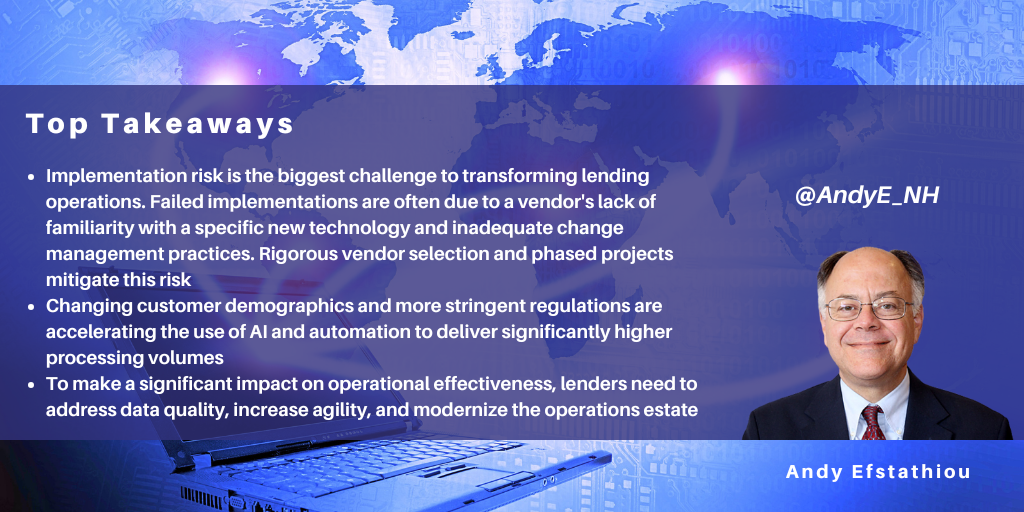posted on Jul 18, 2025 by Andy Efstathiou

I recently completed a global market assessment of mortgage and loan operations services. I found that the mortgage and loan industry is restructuring at a faster pace than at any time since the Savings and Loan Crisis of the early 1990s, as mergers and divestitures have increased in size and frequency.
For example, over the past twelve months in the U.S., Rocket Mortgage has acquired Mr. Cooper for $9.4 Bn. This merger combines the largest mortgage servicer with the largest originator in the U.S. The combined company will service 10m mortgages, 17% of all U.S. mortgages, and Rocket Mortgage forecasts it can save $500m in operating costs post-merger. Elsewhere, other medium-sized market participants have divested their mortgage operations to focus on their core businesses.
The challenge of operational transformation
The lending industry remains a highly manual operational environment. The high cost of loan origination, increasing competition, and evolving technology is driving industry participants to automate processes and embed AI into their operations. The changing market environment, including shifting customer demographics (such as younger and unbanked individuals) and increasingly stringent enforcement of regulations (especially KYC/AML), is driving the acceleration of automation to accommodate significantly higher processing volumes.
Successful operations transformation requires change on a large scale. To make a big impact on operational effectiveness, lenders need to address three issues:
- Data: None of the emerging AI technology works without clean data from multiple sources. Data sourcing, extraction, scrubbing, and indexing from new channels and new ecosystems are required to enable an intelligent organization
- Agility: Lending is a cyclical business. Delivering cost-effective operations requires operations with a non-linear cost structure. Lenders need to move to hybrid multi-cloud delivery with high levels of process automation to increase operational flexibility
- Modernization of the operations estate: Lenders cannot simply rip and replace systems without undue risk and cost. Lenders need to develop a structured replacement strategy utilizing microservices, APIs, and app marketplaces to employ best-of-breed solutions for each sub-process.
Lenders have been applying these strategies to modernize origination and default management services, while loan servicing has seen less transformation activity. Where lenders have modernized their servicing activities, their efforts have focused on process automation and the modernization of collateral management.
Across all processes, the shift from manual to digital processing has delivered the highest ROI. GenAI promises to deliver additional cost and time savings on judgment-based processes, such as credit assessment, product offers presented to borrowers, and risk/security management.
Regional and local lenders are using managed services and BPS to mitigate their staffing disadvantage. Their focus is on buying standardized offerings to enable them to compete with tier-one and digital lenders.
Summary
The biggest challenge to transforming lending operations is the risk of implementation. Many of the most successful implementations have been done after an initial failed attempt with a previous vendor. Failed implementations often occur due to a vendor's lack of familiarity with a specific new technology and inadequate change management practices. Lenders generally avoid full platform replacement strategies in favor of phased modernization or decoupling of functionality. These strategies are easier to pursue using cloud delivery, which reduces risks by moving technology change management to the cloud provider, leaving business change management as an internal task.
Third-party vendors can provide valuable insights, best practices, and product selection services for emerging technologies, leveraging their experience with AI, automation, and cloud technologies, which is especially helpful to regional and local banks. These best practices are developing rapidly as FinTech and cloud technology continue to evolve.
I will publish a market assessment on transforming mortgage and loan services in July to delve deeper into this market. It will identify how the market is evolving, what services banks are buying to support their transformation efforts, and the benefits being realized.
